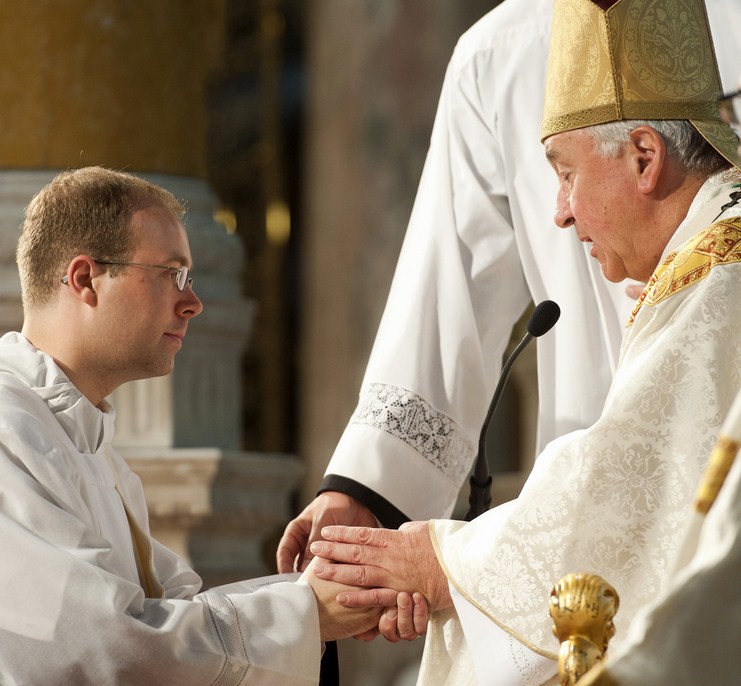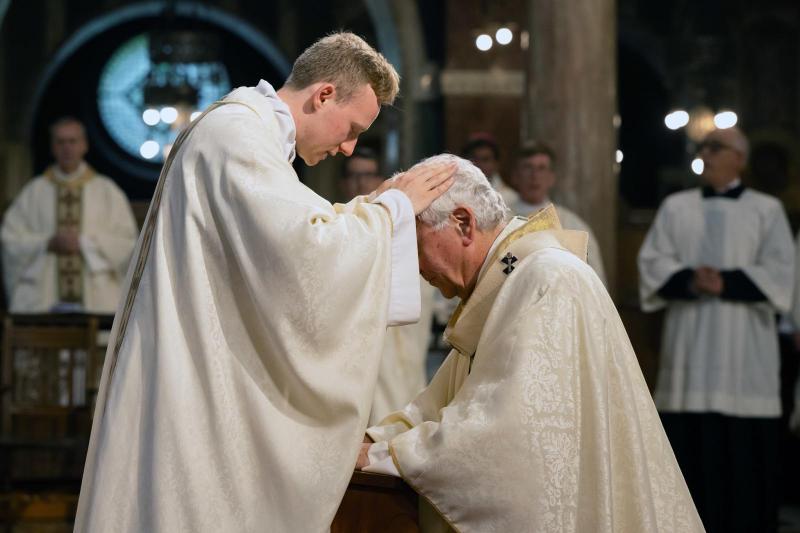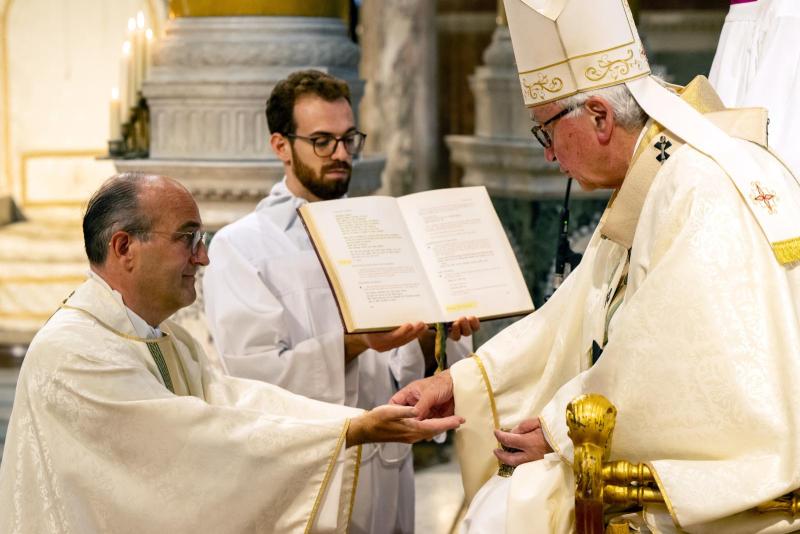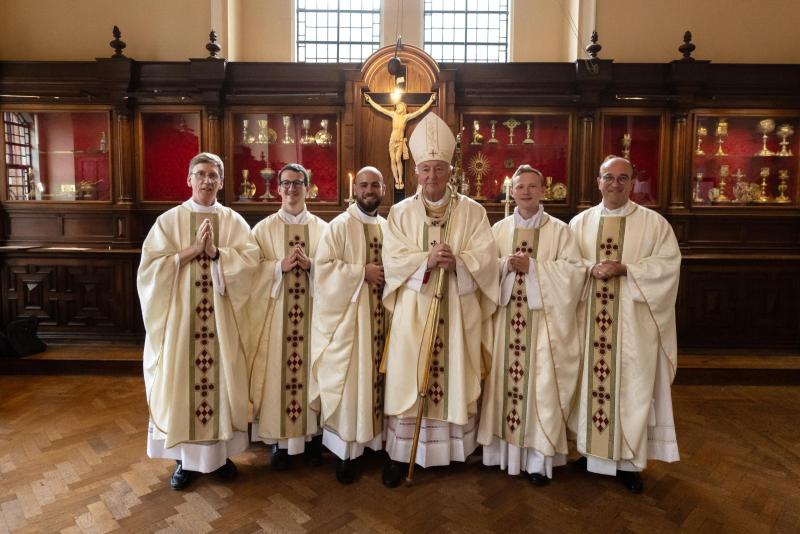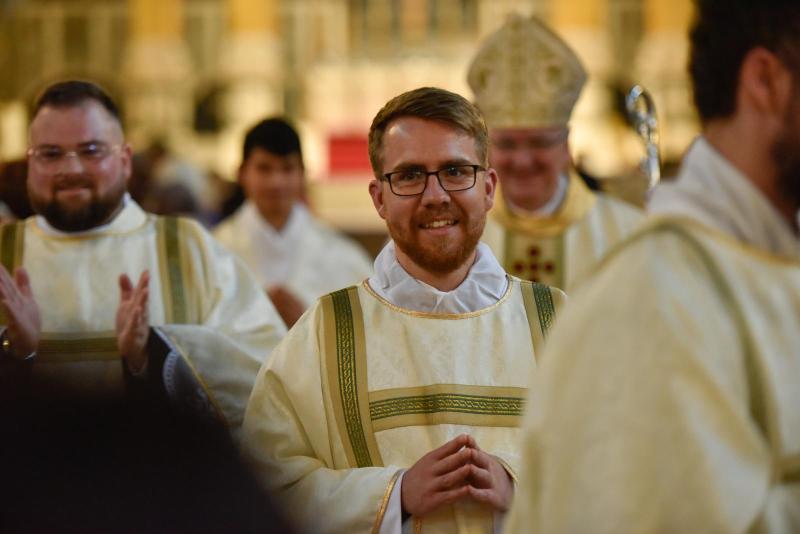How do I know if God is calling me to be a Priest?
Want to speak to someone about whether God might be calling you to the priesthood? Contact Canon Stuart Wilson, Vocations Promoter, at vocationspromoter@rcdow.org.uk or call 020 7349 5620.
Should we look for signs?
The Lord does send signs, but we have to be careful! When we use the word ‘sign’ it may make us think of visions and voices. It is true that sometimes something clear and dramatic helps us, but usually God speaks to us in ordinary ways, guiding us through the events and experiences of our daily lives; through the ‘ordinary’ experience of our Christian faith (which of course is not at all ordinary). Deep down, it is not about signs, but about an ever-deepening personal relationship with the Lord – his love and care for me, his call, what he has created me for; and how I respond to that with the gift of my whole life. But he uses certain signs to call out to us, just as we use words and gestures when we communicate with other people.
Below is a list of some of the initial ‘signs’ that God may be calling you to the priesthood:
The desire to be a priest. Perhaps you can’t explain why, but you feel you would love to do what a priest does – to celebrate Mass, or preach, to baptise or visit the sick. Maybe you can’t explain why you have this desire - you just imagine yourself as a priest and it seems to fit, even if it makes you afraid or you think it would be impossible. And this desire is different from just an ambition. We can be ambitious for the priesthood – we can turn it into a possession or an achievement: ‘wouldn’t it be great if…’ But this is not the same as a vocation. Ambition in this sense turns the priesthood into an external possession; but a vocation is more like a deep personal desire to become what you feel you should be. There is a joy and excitement when you think about it, a sense that this is the right path, and it will lead to the place you are meant to be.
The desire may be long-term or gradual or recent.
There are different kinds of desire – let me list four:
(i) Some people have always wanted to be a priest: they cannot remember a time when they did not have this desire; they pretended to be priests when they were a child; it seems to be a part of them.
(ii) Some people have gradually wanted to be priests: it has grown over time, perhaps as their faith has grown; or it has come and gone, but now seems to be a bit stronger and a bit more enduring.
(iii) Some people have always wanted NOT to be a priest: this might sound strange, but there are people who have always been fighting it, resisting, walking away, giving excuses why not; and this is because deep down they have always known it is a part of them; and at some point they realise that, in fact, people without vocations do not normally go around thinking about why they don’t have a vocation!
(iv) And some people suddenly want to be priests: they have gone through a life-changing spiritual experience; it has never occurred to them before but now it does; the priesthood is something new, sudden and unexpected, but very real and almost overpowering. This is why the Church asks new converts to have time to settle into their new Catholic life for a few years before seeking ordination.
The idea of the priesthood keeps coming back.
In your prayer, your daydreaming, your imagination; in your reading of the gospels – you find yourself coming back to ideas about the priesthood. Some scripture passage seems to be directed at you – about the priesthood, or the call of the disciples, or service. These passages seem to stand out for you and have a kind of clarity. You hear a sermon about the priesthood, or read something, and it seems personal; as if a light comes on, or it warms your heart; or as if someone is pointing at you.
Admiration for priests you know.
You admire certain priests you have met and know. There is a goodness and holiness in their lives. You have an attraction to something they have or represent. They seem to be living a life worth living, in a way that speaks to you. You are drawn to them.
Sense of being pulled or pushed toward the priesthood.
This can be true even if you do not seem to have any real personal desire. It is a nagging feeling that you should or could become a priest, which seems to come from nowhere, uninvited; an idea you can’t get out of your mind. It might leave you cold, or even repel you – in the sense that your instincts and gut fight against it. It’s as if part of you knows you should; there is an inner sense of duty, or call – even if it is reluctant.
Attraction to things associated with the priesthood.
Perhaps you do not have any explicit desires to be a priest, but you are attracted to many of the things that are involved in the life of a priest. You have a desire to serve people in different ways, or to pass on the faith, or to pray with and for others. Maybe you find less satisfaction in your work, not because it is wrong, but you feel it is not enough. You find yourself becoming more involved in the life of the parish as a reader or Eucharistic minister or catechist etc... You are giving your life in service more, in the SVP, or helping the poor or the young. Lay people and religious also feel these pulls, but perhaps for you they are pulls to something priestly.
Inner desire to pray more
To take the faith more seriously. You just find that you want to pray more and to learn more about your Catholic faith. The Mass seems to mean more to you. You have become more honest about your faults and failings, and desire to go to confession more often than in the past. You are reading more about the faith, or the priesthood – it inspires you; your interest grows. Your love for Christ is growing, and your love for the Church.
Basic desire to give your life to God completely.
Of course this is true for many holy lay-people! But it can often be the beginning of a priestly vocation, even when there is no idea of the priesthood at the beginning. You are not sure why, but you have a feeling that you can’t hold anything back. It is not enough for you just to work and plod along and say a few prayers and be nice to people – you want to give your whole heart, and you are not sure how or why. For some people the idea of celibacy comes to mind even before the explicit idea of priesthood, and before the Church explains how important it is – not because they dislike marriage, but because they feel called to give their life wholeheartedly to serve God and others, in a way that would be difficult within the commitments of marriage and family life. There can be a feeling that for me I couldn’t be free to serve the Lord if I were married with children.
Other people affirm your vocation.
When you talk to people about the possibility of the priesthood, especially committed Catholics, they don’t look as if you are mad. They affirm it, and say, ‘Of course, I could have told you that years ago!’ They encourage you. In other words, in the eyes of others this vocation also seems to make sense – it is not just a subjective sign for you, but it is beginning to be a more objective sign to others too.
Support from your ‘spiritual director’.
You may not have a formal spiritual director, but perhaps there is someone wise and trustworthy that you have chatted to about your vocation over a period of time; you have talked things through with them and they know you quite well. If they affirm what you have said, and it seems to them that you may have a vocation, then this is another more public sign that it may be true. At least it is a sign to take things further forward.
A feeling that you are not up to being a priest, that you are not worthy to be a priest.
This might seem like a paradox, but it can be true. Sometimes, of course, the priesthood is not right for someone, and they know this, and accept it happily. But at other times, someone may have a deep feeling that the priesthood is too much of an ideal for them, that they are not worthy, or not good enough (morally), or not capable enough. These feelings can be a sign of humility, an indication that someone has a healthy sense of their own limitations, and a high sense of the dignity of the priesthood. The feeling of unworthiness may, strangely, be a sign that someone has a true appreciation for the priesthood, and that they will be open to asking for God’s help and the help of the Church. It would be worrying if someone thought the priesthood was easy; or if they thought they could achieve it through their own efforts.
Certain essential things. There are certain basics that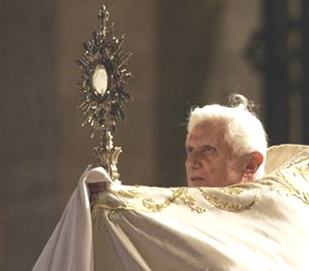 we normally ‘need’ if God is really calling us, and if these are lacking then a priestly vocation is probably not for us at this time in our lives – although it may show itself later on. If something concerns you here, do not just panic and rule yourself out, as we often judge our situation too quickly or too harshly, and there may be other factors which are greatly in your favour. But the basic things that we ‘need’ include:
we normally ‘need’ if God is really calling us, and if these are lacking then a priestly vocation is probably not for us at this time in our lives – although it may show itself later on. If something concerns you here, do not just panic and rule yourself out, as we often judge our situation too quickly or too harshly, and there may be other factors which are greatly in your favour. But the basic things that we ‘need’ include:
- a commitment to one’s Catholic faith – a love for Christ, for the Sacraments, for the People of God.
- a love and respect for the Catholic Church and for her teachings, and a desire to share that faith with others (even if we find some things more difficult to believe than others).
- a commitment to the commandments and to living a moral life (even if we are weak and still struggle); you are trying to live a chaste life.
- basic physical and mental health (serious medical conditions will make it difficult for us to live and work as a priest).
- a reasonable academic ability (we may not have many qualifications, but we need to have a basic ability to study).
- a personal and emotional maturity (it will be very difficult for us to live in seminary, and to engage in pastoral work, if we have some deep and unresolved psychological issues; if we can’t get on comfortably with different people; if we are really struggling with some kind of addiction or anything else that is dominating our life at this moment).
- you have not been married; you do not have any big responsibilities that would take away your freedom to become a priest (children; huge debts; seriously ill dependent relative etc...).
How to ‘Interpret the Signs’
The overarching sign of a vocation will be an enduring attraction to the idea of the priesthood, accompanied by a deep sense of peace and joy in reflecting on this attraction. This does not mean the attraction will be without fears and anxieties. However, if the idea of the priesthood comes with a deep sense of panic, fear or anxiety (this is different from the natural humility and reluctance we feel) it may mean it is not right for us, and we would be much happier somewhere else! Usually, God gives us enough to go on – he does not play games with us. If we listen and look carefully, over a period of time, patiently, then usually a pattern will form, and things will become clearer. In this sense we do not need to ask for supernatural signs, visions, dreams... We should certainly pray for help and guidance, but usually God will guide us in these ordinary ways.
What to do next
If these signs grow stronger and come together, then we should take the next step – talk to someone we trust; talk to our parish priest; talk to the Vocations Director of the Diocese (for Westminster, contact Fr Richard Nesbitt at richardnesbitt@rcdow.org.uk). When we do this, we move to a new stage in our discernment, which is trusting in the discernment of the Church. This is more objective and ‘public’ – it involves other people and ultimately the Bishop, who is the one with the final responsibility of calling people to the priesthood on behalf of Christ. It can be hard to take this step and approach the Church and involve others; but it will also give us great peace – because it is no longer just us trying to find what is right, we have the support and advice of others.
At the end of the day, we can trust the Church to help us discern. If the Vocations Director encourages us to apply to the Diocese; and then if the Selection Conference supports us and our bishop accepts us, then this is the surest sign possible that the Lord is inviting us at least to take the next step into seminary. It still leaves 6 years to discern and become sure – but we can have the assurance that we are doing the right thing for the moment. If the Vocations Director suggests we hold back for a bit, or if the Bishop decides not to accept us for priesthood at this point, this is not a rejection or a negative thing – it is the way that God is leading us to something else, something that is more right for us, a different way of life where we can be holy and live out a different vocation. It may be that we come back to priesthood later; it may be that we become clearer about another direction. In all of this, it is essential to listen to the wisdom of the Church and not only our own subjective ‘signs’. The Church is not looking for volunteers to the priesthood – she is looking for those who are being called by God to this extraordinary vocation and this needs to be discerned by both the candidate and by the Church.
This article is adapted from the CTS booklet “How to Discover your Vocation” by Fr Stephen Wang
